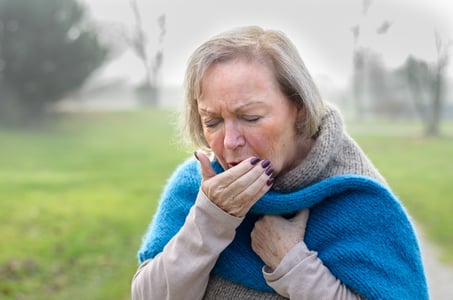
Chronic Obstructive Pulmonary Disease is an umbrella term for progressive lung conditions like emphysema and chronic bronchitis. Chief among the symptoms is a persistent productive cough. Ideally it's productive in the sense that, it brings up sputum. This is especially important as it keeps the airways clear. In this case, the patient is advised not to try to suppress the cough but only to practice controlled coughing.
Controlled coughing is taught by the physician or during pulmonary rehabilitation to aid in clearing up of sputum. The steps for controlled coughing are also available online. The sputum should be spat out and not swallowed as it can cause tummy troubles. However, there are times when the coughing is worse than usual.
Irritants, comorbidities like GERD and pneumonia, may bring on increased coughing or the body could be producing more mucus for another reason. Increased physical activity might also cause more coughing than usual. Coughing takes up a lot of energy and can be quite disruptive in social situations. It also interrupts sleep. It is possible to suppress the cough without using drugs or other clinical devices.
Simple Management of COPD Related Cough
1. Give Up the Cloud
It should be understood that smoking is the worst thing a COPD patient can do. Not only does it cause exacerbation, it worsens the cough that comes with COPD. Cigarette smoke dries out vocal chords. To replace the lost moisture, the body reacts by producing more phlegm, which will block airways. Therefore, a person with COPD should stay away from cigarette and cigarette smoke. Even secondary cigarette smoke or smoke from a fireplace could harmful.
2. Drink Water
Staying hydrated is key. Drinking a lot of fluids helps loosen the mucus thus making it easier to cough it up. This reduces the urge to cough. It also keeps the throat well lubricated and clear of secretion.
3. Lemon and Honey
This is a great home remedy for cough and cold. Not only is it rich in vitamin C, the honey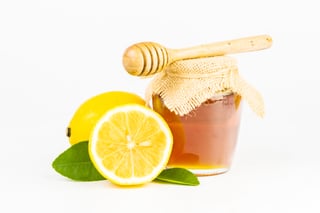 contains some very important and essential elements. A glass of hot water, squeeze in some lemon and drop in a little honey, this simple concoction will help the patient sleep better because they will not cough too much. One may drop in a little ginger for a touch of spicy antioxidants. The patient may also try out other spicy items like peppermint, these thins out the secretions.
contains some very important and essential elements. A glass of hot water, squeeze in some lemon and drop in a little honey, this simple concoction will help the patient sleep better because they will not cough too much. One may drop in a little ginger for a touch of spicy antioxidants. The patient may also try out other spicy items like peppermint, these thins out the secretions.
4. Diet
- Foods rich in vitamin D will help strengthen the respiratory muscles, recent studies have shown.
- Omega 3 foods like Avocado and antioxidant vitamins when combined together make for a good remedy for persistent coughing.
- Dairy may not cause production of more mucus but it sure will thicken the existing. Thick mucus will be hard to cough up and will cause persistent coughing. Milk may coat the throat leading one to feel like they have phlegm stuck on the wall of the throat.
- Pineapples may just seem like a sweet fruit but they are rich in bromelain, which is a protein-digesting enzyme. Incorporating pineapples into the diet will cause a reduction in production of mucus. Pineapple juice can also help soothe a sore throat.
- Excess sodium causes water retention. Water retention will cause difficulty breathing and bring on a coughing fit so salt should be consumed in as little amounts as possible.
5. Humidifier
Before one can apply these home remedies, they need to be sure about the cause of the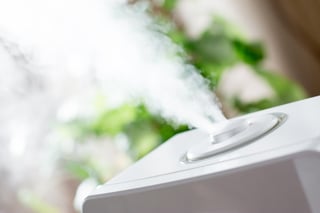 increased coughing. If it is due to dry air, a humidifier or vaporizer can come into play. Releasing a little moisture into the air will help keep the airways clear of secretions. It will also help the patient breath better. However, using a humidifier might cause the cough to worsen and therefore this remedy should be applied with caution and discussion with your physician or respiratory therapist.
increased coughing. If it is due to dry air, a humidifier or vaporizer can come into play. Releasing a little moisture into the air will help keep the airways clear of secretions. It will also help the patient breath better. However, using a humidifier might cause the cough to worsen and therefore this remedy should be applied with caution and discussion with your physician or respiratory therapist.
6. Triggers
These are irritants that cause a coughing fit. It may be anything from strongly scented cleaning products, to perfume, to dust. The patient should ensure they create distance between themselves and elements that may trigger their COPD symptoms.
7. Stay Upright
Keeping the torso elevated will help drain mucus. This is the same concept applied in postural drainage. This is whereby the patient keeps the lower body elevated and lets gravity drain sputum into the mouth, where it can be easily coughed up or just simply spitted out.
This is a technique used mostly right before bedtime to clear up mucus to enable the patient to sleep better without the threat of secretion blocking airways. The sleeping position is also an important factor, as sleeping in a way that causes secretion to pool in the throat thus blocking the airways can cause a coughing fit. The patient should sleep on their side with the head elevated.
8. Toast
Bread is delicious and in this case, it can serve two purposes. A patient can swallow a piece of toast when they feel like some mucus may be stuck on the wall of the throat. The toast softly scrapes the mucus off as it is ingested.
9. Stress
Anxiety and stress is an enemy to COPD wellness. Being in a state of restlessness may cause the symptoms of COPD to be worse. It is therefore important that one keeps calm not only for the peace of mind but also to keep coughing suppressed.
10. Nice Bath
A warm relaxing bath with Epsom salts can work wonders after a long day or after a  challenging work out. It is great for the muscles. Epsom salts aid in vasodilation, which is a process that increases the production of white blood cells. With more white blood cells, the body can fight COPD comorbidities better. If rubbed into the skin, Epsom salts help clear congestion.
challenging work out. It is great for the muscles. Epsom salts aid in vasodilation, which is a process that increases the production of white blood cells. With more white blood cells, the body can fight COPD comorbidities better. If rubbed into the skin, Epsom salts help clear congestion.
11. Apple Cider Vinegar
This does not taste great but drinking a tablespoon and swallowing really fast might be advantageous in clearing that cough that just won’t ease up. Mixing it with fruit juice makes it taste much better as well.
12. Hum
Humming is a great mood lifter. It may be a bit out of the box but it could work. The vibration from humming brings up the phlegm and voila, airways are clear.
13. Breathing Exercises
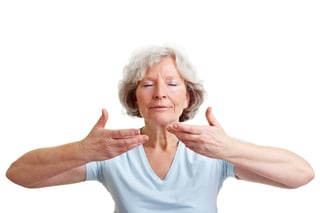
These are usually taught during pulmonary rehabilitation or at a regular doctor’s visit. A patient may opt for a combination of pursed breathing to reduce shortness of breath or belly breathing for a stronger diaphragm. Breathing exercises also help with other COPD symptoms like sleeping problems and wheezing.
14. Exercise
Regular physical activity is essential. Water based exercises have been reported to be better for people with COPD as they require a little less exertion but still come with a lot of benefits. Yoga and tai chi are also great physical and spiritual exercises. The ability to tolerate physical activity is important to improve quality of life and keep COPD symptoms suppressed. This also ensures the patient does not suffer shortness of breath and a coughing fit after minimal activity.
15. VapoRub
This is an age-old menthol based ointment for application on the back, throat and chest. It is effective in the suppression of cough.
In Addition…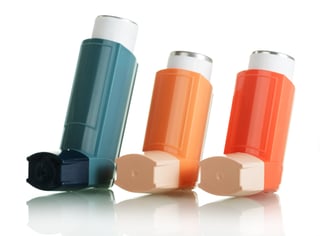 When all else fails, it might be time to try medical or pharmaceutical intervention. This is of course after consultation with your physician. In fact, nothing health related should happen without the physician’s knowledge. Some things like a change in diet or jogging may seem harmless but could cause severe repercussions. Bronchodilators will be instrumental in helping reduce airway spasm. This is the sudden tightening of the respiratory muscles. Anticholinergics are also important as they relax the muscles by interfering with enzymes. The physician might also prescribe an expectorant or cough syrup for when the cough is too disruptive and persistent. Pulmonary rehabilitation is of utmost importance for patients with COPD. They are equipped with skills to help them breath better and more awareness to triggers.
When all else fails, it might be time to try medical or pharmaceutical intervention. This is of course after consultation with your physician. In fact, nothing health related should happen without the physician’s knowledge. Some things like a change in diet or jogging may seem harmless but could cause severe repercussions. Bronchodilators will be instrumental in helping reduce airway spasm. This is the sudden tightening of the respiratory muscles. Anticholinergics are also important as they relax the muscles by interfering with enzymes. The physician might also prescribe an expectorant or cough syrup for when the cough is too disruptive and persistent. Pulmonary rehabilitation is of utmost importance for patients with COPD. They are equipped with skills to help them breath better and more awareness to triggers.
To improve the quality of life, there are some mechanical remedies for coughing and other COPD symptoms. Chest physiotherapy is an assisted exercise to help loosen thick mucus. This is usually combined with postural drainage. Positive expiratory pressure uses a device to help force thick and sticky mucus through the larger air passages so they can be expelled. High Frequency Chest Wall Oscillation uses an inflatable vest to apply positive air pressure pulses against the chest. This action clears mucus and consequently, coughing.
There is a lot a COPD patient can do to suppress excessive coughing before they turn to clinical intervention. Some good old remedies passed down from our grandparents work just fine and sometimes even better than cough syrup and the like.



